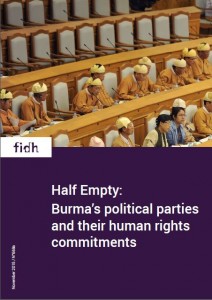Half Empty: Burma’s Political Parties and their Human Rights Commitments
By International Federation for Human Rights • November 3, 2015 On 8 November 2015, Burma’s electorate will vote for the representatives who will sit in Parliament from 2016 to 2021. The polls are anticipated to usher in a Parliament that will be markedly different from the body that was installed as a result of the November 2010 election and the April 2012 by–elections. This will be due to the significant number of seats that the National League for Democracy (NLD), the party led by Daw Aung San Suu Kyi, is expected to win.
On 8 November 2015, Burma’s electorate will vote for the representatives who will sit in Parliament from 2016 to 2021. The polls are anticipated to usher in a Parliament that will be markedly different from the body that was installed as a result of the November 2010 election and the April 2012 by–elections. This will be due to the significant number of seats that the National League for Democracy (NLD), the party led by Daw Aung San Suu Kyi, is expected to win.
The November 2010 election was tainted by a flawed legal framework, a lack of inclusiveness, widespread corruption, irregularities, and voter fraud, and was boycotted by the NLD.1 As expected, the military–backed Union Solidarity and Development Party (USDP) overwhelmingly won the polls. Dominated by the USDP and military–appointed members of Parliament (MPs), Parliament failed to amend or repeal many of Burma’s oppressive laws and blocked key constitutional amendments. In many cases, newly enacted legislation contained provisions that ran counter to international human rights standards. Other new laws prioritized political and economic interests over human rights. In addition, MPs rejected numerous proposals aimed at addressing important human rights issues.
Download the full report in English here.
Tags: 2015 Elections, ASEAN, Aung San Suu Kyi, Crimes against humanity, Ethnic Nationalities, FIDH, Freedom of, Freedom of Assembly, Freedom of Association, Freedom of Information, Freedom of Religion, Freedom of Speech, Human Rights, Human Rights Violations, International Federation for Human Rights, National League for Democracy, Political Prisoners, Union Solidarity and Development PartyThis post is in: 2015 Burma Elections, ASEAN, Business and Human Rights, Children and Youth, Crimes Against Humanity, Displacement, Economy, Environmental and Economic Justice, Ethnic Nationalities, Health, Human Rights, Human Trafficking, International Relations, Military Regime, Political Prisoners, Resistance, Women
Related PostsArmed Forces and Democratization in Myanmar: Why the U.S. Military Should Engage the Tatmadaw
Burma: Country Reports on Human Rights Practices for 2015
Report of the Special Rapporteur on the situation of human rights in Myanmar
Atrocities Prevention Report: Targeting of and Attacks on Members of Religious Groups in Burma
The 2015 Elections and Beyond: Perspectives from villagers in rural southeast Burma/Myanmar









 All posts
All posts